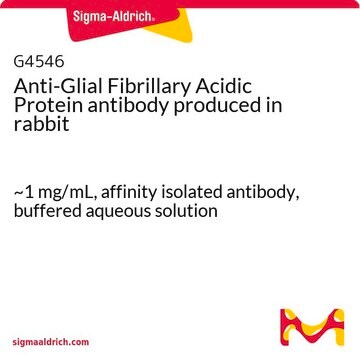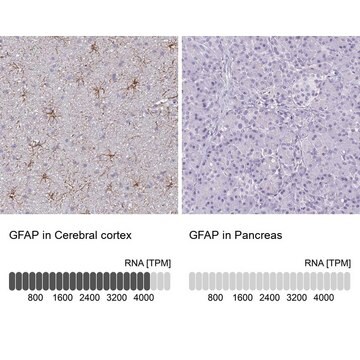G6171
Anti-Glial Fibrillary Acidic Protein Antibody
mouse monoclonal, G-A-5
Synonym(s):
Anti-GFAP
About This Item
Recommended Products
product name
Anti-Glial Fibrillary Acidic Protein antibody, Mouse monoclonal, clone G-A-5, purified from hybridoma cell culture
biological source
mouse
Quality Level
conjugate
unconjugated
antibody form
purified from hybridoma cell culture
purified immunoglobulin
antibody product type
primary antibodies
clone
G-A-5, monoclonal
form
buffered aqueous solution
mol wt
antigen ~50 kDa
species reactivity
rat, human, pig
concentration
~1.0 mg/mL
technique(s)
immunocytochemistry: suitable
immunohistochemistry: suitable
indirect immunofluorescence: 2.5-5 μg/mL using alcohol-fixed sections of rat brain/cerebellum.
western blot: suitable
isotype
IgG1
UniProt accession no.
shipped in
dry ice
storage temp.
−20°C
target post-translational modification
unmodified
Gene Information
human ... GFAP(2670)
mouse ... Gfap(14580)
pig ... GFAP(396562)
rat ... Gfap(24387)
General description
Immunogen
Application
Biochem/physiol Actions
Physical form
Disclaimer
Not finding the right product?
Try our Product Selector Tool.
antibody
recommended
Storage Class Code
10 - Combustible liquids
Flash Point(F)
Not applicable
Flash Point(C)
Not applicable
Certificates of Analysis (COA)
Search for Certificates of Analysis (COA) by entering the products Lot/Batch Number. Lot and Batch Numbers can be found on a product’s label following the words ‘Lot’ or ‘Batch’.
Already Own This Product?
Find documentation for the products that you have recently purchased in the Document Library.
Customers Also Viewed
Our team of scientists has experience in all areas of research including Life Science, Material Science, Chemical Synthesis, Chromatography, Analytical and many others.
Contact Technical Service










